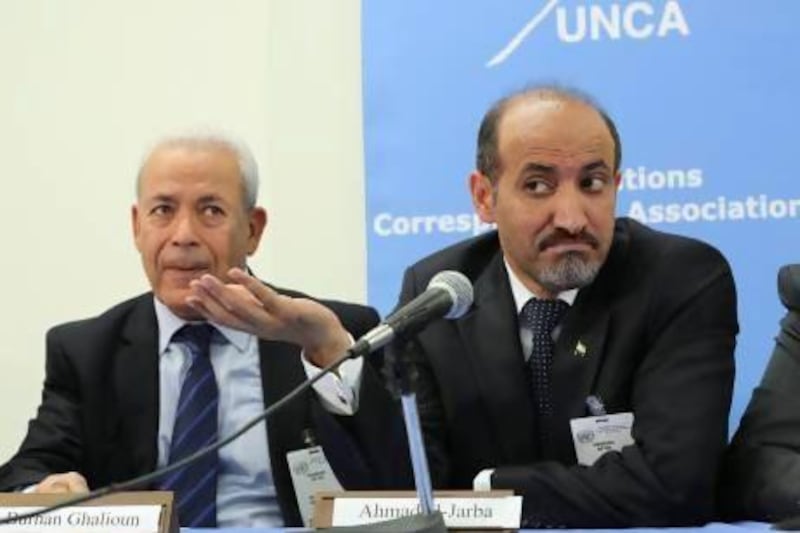New York // Syria's western-backed rebel leaders met the United Nations Security Council for the first time on Friday and said they were prepared to attend peace talks if the Syrian president, Bashar Al Assad, relinquished power.
They also called on Russia to end its political and military support for Damascus.
The newly-elected president of the Syrian National Coalition, Ahmed Al Jarba, said he told the council members to push harder for a political settlement and said the rebels require "far more international pressure to force the Assad regime to accept a political transition".
The United States and its allies on the council urged the rebels during informal meetings at the UN to agree to hold a peace conference in Geneva.
But so far the efforts have failed, with both the rebels and the government setting conditions for meeting to enact a UN-brokered plan to establish a governing body comprised of both opposition and government officials that would oversee a political transition.
Syria insisted that the 2012 plan, known as the Geneva Communique, did not require Mr Al Assad to step down, while the rebels said that it did.
Diplomats have said that the prospects of the conference are increasingly dim.
After meeting the Security Council, the opposition delegation said that they would attend the talks but that they had other conditions besides Mr Al Assad stepping down. One senior opposition official, Burhan Ghalioun, said the Syrian army must stop using heavy weapons and that the government peace negotiators must not have blood on their hands.
"We made it very clear to [US secretary of state John] Kerry that we accept" the Geneva peace process, Mr Ghalioun said on Friday.
"We also told Kerry if you want Geneva you should push Russia and Assad to at least stop using ballistic missiles and chemical weapons" because before talks the Syrian people must "feel a little bit of comfort that there is something happening on the ground".
In recent weeks the Syrian government has consolidated its military position with a string of victories, frustrating the increasingly fractious rebels who insist that they must be in a stronger position before talks can begin.
During meetings with Mr Kerry and other western diplomats the rebel delegation was reported to have tried to assure them that any arms supplied to the Free Syrian Army would not fall into the hands of jihadist groups.
"Why would we transfer weapons to extremists who don't recognise our leadership?" Mr Ghalioun asked, according to diplomats.
The US Congress finally agreed last week to a White House plan to send light arms to vetted rebel groups and Mr Al Jarba said he asked Mr Kerry to hasten the delivery of the weapons and to send anti-aircraft and anti-tank weapons that would reverse the momentum on the ground.
The Security Council has so far been locked in disagreement between its western members and Russia, which is Syria's main international ally and arms supplier, and has not been able to intervene in the two-and-a-half-year war that has killed more than 100,000 people and displaced millions.
The rebel leaders at the UN appealed to Russia to stop arming Syria. "We asked [Russia] to stop providing the political and military support for this criminal regime to continue its crimes against the Syrian people," another rebel member, Najib Ghadbian, said, after the meeting.
Vitaly Churkin, Russia's UN ambassador, called the meeting with rebels "useful" but that he was dismayed by their preconditions to peace talks.
The rebel delegation also asked the Security Council to increase access for aid agencies in Syria and some council members are reportedly considering a push for a resolution on humanitarian aid.
Russian officials have described any such plan as a potential cover for covert western military involvement.





